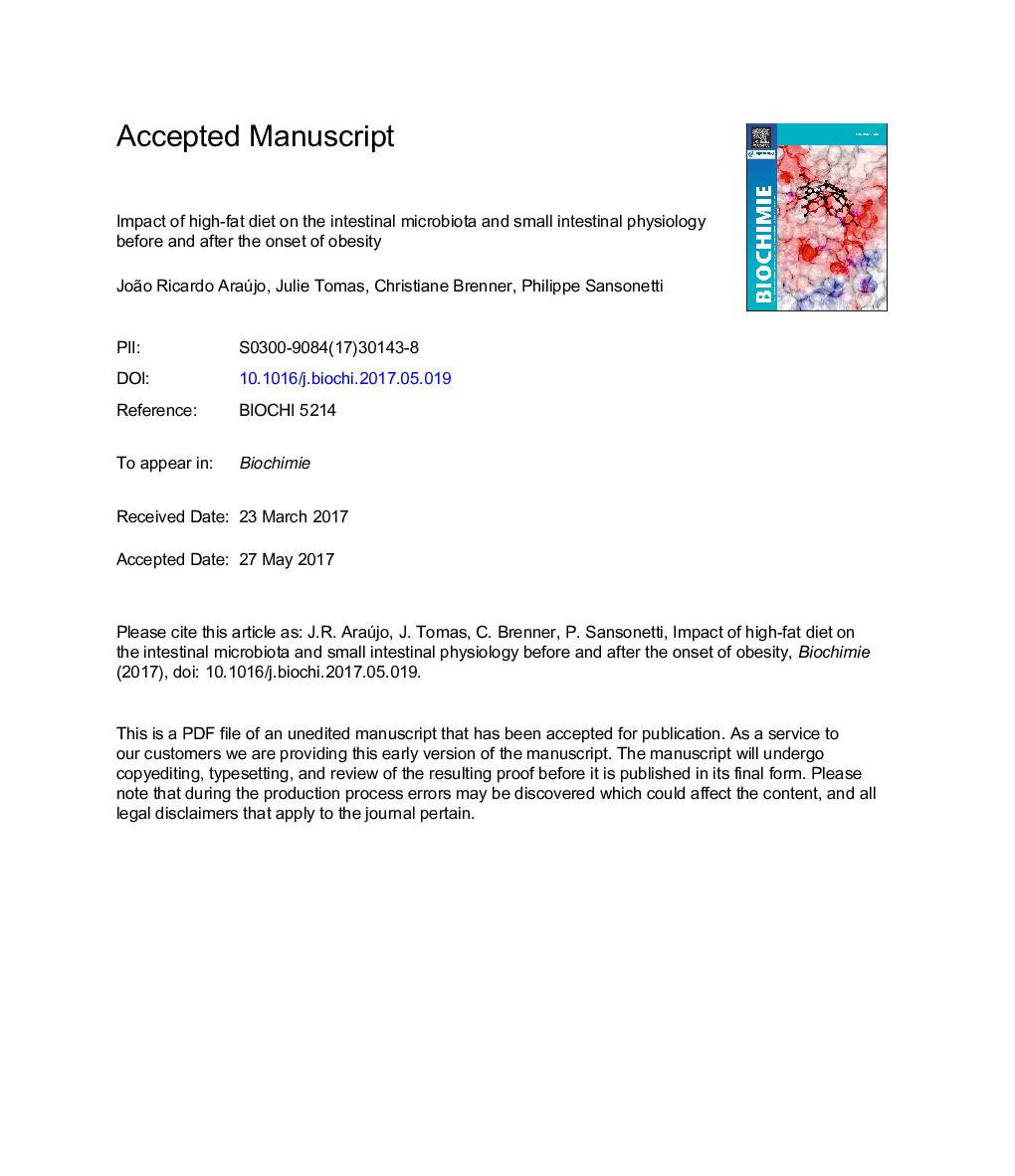| کد مقاله | کد نشریه | سال انتشار | مقاله انگلیسی | نسخه تمام متن |
|---|---|---|---|---|
| 5508919 | 1538391 | 2017 | 40 صفحه PDF | دانلود رایگان |
عنوان انگلیسی مقاله ISI
Impact of high-fat diet on the intestinal microbiota and small intestinal physiology before and after the onset of obesity
ترجمه فارسی عنوان
تاثیر رژیم غذایی با چربی بالا بر روی میکروبیوتایپ روده و فیزیولوژی روده کوچک قبل و بعد از شروع چاقی
دانلود مقاله + سفارش ترجمه
دانلود مقاله ISI انگلیسی
رایگان برای ایرانیان
کلمات کلیدی
NODLPSTFF3PRRsTLRNF-κBHFDECs - EC هاinflammation - التهاب( توروم) interleukin - اینترلوکینtumor necrosis factor-α - تومور نکروز عامل αnucleotide-binding oligomerization domain - دامنه oligomerization اتصال دهنده نوکلئوتیدIntestine - رودهhigh-fat diet - رژیم غذایی با چربی بالاepithelial cells - سلول بافت پوششی یا اپیتلیومzonula occludens - شل بستنTrefoil factor 3 - عامل تراوفیل 3TNF-α - فاکتور نکروز توموری آلفاNuclear factor-kappa B - فاکتور هسته ای-کاپا Blipopolysaccharide - لیپوپلی ساکاریدMucus - مخاط، موکوس Obesity - مرض چاقیMicrobiota - میکروبیوتاFat - چربیpattern-recognition receptors - گیرنده های شناخت الگویToll-like receptors - گیرنده های پولی مانند
موضوعات مرتبط
علوم زیستی و بیوفناوری
بیوشیمی، ژنتیک و زیست شناسی مولکولی
زیست شیمی
چکیده انگلیسی
The modulation of the intestinal microbiota by high-fat diet (HFD) has a major impact on both immunological and metabolic functions of the host. Taking this into consideration, the aim of this contribution is to review the impact of HFD on microbiota profile and small intestinal physiology before and after the onset of obesity and its metabolic complications. Evidence from animal studies suggest that before the onset of obesity and its metabolic complications, HFD induces intestinal dysbiosis - encompassing changes in composition balance and massive redistribution with bacteria occupying intervillous spaces and crypts - associated with early physiopathological changes, predominantly in the ileum, such as low-grade inflammation, decreased antimicrobial peptides expression, impaired mucus production, secretion and layer's thickness, and decreased expression of tight junction proteins. With time, major inflammatory signals (e.g. toll-like receptor-4 dependent) become activated, thereby stimulating proinflammatory cytokines secretion in the small intestine. This inflammatory state might subsequently exacerbate disruption of the mucus layer barrier and increase epithelial permeability of the small intestine, thereby creating an environment that facilitates the passage of bacterial components (e.g. lipopolysaccharide, peptidoglycan and flagellin) and metabolites from the intestinal lumen (e.g. secondary bile acids) to the circulation and peripheral tissues (i.e. leaky gut), eventually promoting the development of systemic inflammation, obesity, adiposity, insulin resistance and glucose intolerance preceding hyperglycemia. Although the mechanisms are still not completely understood, prebiotics, probiotics, polyphenols, peroxisome proliferator-activated receptor-γ agonists (such as rosiglitazone) and exercise have been shown to reverse HFD-induced intestinal phenotype and to attenuate the severity of obesity and its associated metabolic complications.
ناشر
Database: Elsevier - ScienceDirect (ساینس دایرکت)
Journal: Biochimie - Volume 141, October 2017, Pages 97-106
Journal: Biochimie - Volume 141, October 2017, Pages 97-106
نویسندگان
João Ricardo Araújo, Julie Tomas, Christiane Brenner, Philippe J. Sansonetti,
